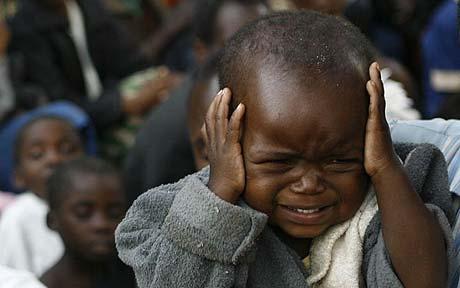Britain hands over more cash in foreign aid than any other country in the world, despite having virtually no control over how the cash is spent and numerous reports detailing how aid is either wasted, or holds back development.
In an investigation by the Commons international development committee, it suggests the government is so desperate to achieve its spending target of 0.7 per cent of GDP it floods agencies with cash often without properly researching what the money will be used for or analysing how effective previous payments have been, The Times reports.
The policy by the coalition government has resulted in Britain spending almost three times more per head on aid than the US: £179 vs £64.
Details in the committee’s report shows that more than £4 billion of the UK’s £12 billion aid budget is sent to multilateral agencies in Europe and America who themselves decide where the money is spent.
This compares most unfavourably to the current crisis in the MoD budget, with Tory backbenchers in particular speaking out against the neglect that the coalition has overseen of Britain’s Armed Forces. With run down housing, troop numbers slashed and an ever decreasing amount of equipment, £4 billion would make the Defence Secretary considerably happier than he must be now.
The binge spending to international agencies was described as a “complete folly” by MPs, with Sir Gerald Howarth, MP for Aldershot saying the decision to pump more money into international organisations showed the government had failed to find projects where they could control how tax payers money was spent. .
“They are just shoving the money into inefficient multinational agencies,” Sir Gerald said. “This comes at a time when armed forces are being held on tenterhooks about whether the government is going to give them 2 per cent of GDP. It is inexplicable that a Conservative-led government is prioritising aid over defence at a time of growing international tension.”
The outspoken former Chief of the General Staff, General Lord Dannatt, said, “DfID [Department for International Development] is at its best when it is giving money to charities on the ground. If it is struggling to do that it would be better to give the money to defence.”
The link between the need to spend the ring-fenced budget and the increasing amounts given to agencies was confirmed by the chairman of the international development committee, Sir Malcolm Bruce.
“There is a balance to be met and multilaterals can play their part but we felt too much had been given this year,” Sir Malcolm said. “However we definitely don’t have the same level of control with what happens to money compared to when it is direct funding.”
The findings were questioned by another Tory MP, Peter Luff, who asked: “Why is it that we are spending more on multilateral aid than any other country? . . . Perhaps it is just an easier way to meet the spending target.”
In an article titled, Why Foreign Aid Is Harmful, Lawyer Jonathan Lea details the number of problems which continued international handouts cause, including institutionalising corrupt regimes and holding back the necessary democratisation needed for development to take place.
‘As aid flows in, citizens of the recipient countries effectively become dis-enfranchised as increasingly all their governments need to do to stay in power is to court and cater to foreign donors. Such governments have less of a need to raise taxes, and as long as they pay their army and security apparatus well, they can be relatively relaxed about the views and opinions of their disgruntled people.
Its stated that across Africa, over 70% of government income comes from foreign aid, meaning that such administrations are seriously compromised and unlikely to act in accordance with the interests of their populations.’
DfID justified its spending, saying: “Investing in overseas development is creating a world that is healthier, more stable and increasingly prosperous and that is something Britain can be proud of.”
“UK aid goes only where it is most needed and where it will deliver the very best results for taxpayers’ money. Over time, the proportion of UK development aid spent as multilateral aid has stayed roughly the same.”

COMMENTS
Please let us know if you're having issues with commenting.